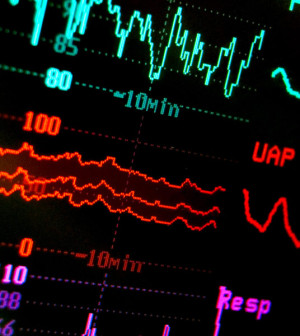- Could Your Grocery Store Meat Be Causing Recurring UTIs?
- Are You Making This Expensive Thermostat Error This Winter?
- Recognizing the Signs of Hypothyroidism
- 10 Strategies to Overcome Insomnia
- Could Artificial Sweeteners Be Aging the Brain Faster?
- Techniques for Soothing Your Nervous System
- Does the Water in Your House Smell Funny? Here’s Why
- Can a Daily Dose of Apple Cider Vinegar Actually Aid Weight Loss?
- 6 Health Beverages That Can Actually Spike Your Blood Sugar
- Treatment Options for Social Anxiety Disorder
Vitamin D Boosts Heart Function in Study

Regular doses of vitamin D3 may improve heart function in heart failure patients, a new British study suggests.
“These findings could make a significant difference to the care of heart failure patients,” said study leader Dr. Klaus Witte, from the University of Leeds School of Medicine. “It is the first evidence that vitamin D3 can improve heart function of people with heart muscle weakness — known as heart failure.”
The study included more than 160 patients who had pacemakers and/or were receiving blood pressure drugs known as ACE inhibitors or beta blockers.
The study participants took either vitamin D or inactive placebo pills once a day for a year.
The researchers explained that they avoided using a calcium-based vitamin D supplement, because calcium can cause other problems for heart failure patients.
Heart pumping function improved from 26 percent to 34 percent in patients who took vitamin D, while there was no change among those who took the placebo pills, the investigators found.
The study was presented Monday at the annual meeting of the American College of Cardiology in Chicago. Research presented at medical meetings is typically considered preliminary until published in a peer-reviewed journal.
The researchers suggested that the improvement seen in some of the patients who took vitamin D might reduce their need for an implantable cardioverter defibrillator (ICD). An ICD is a device that detects dangerous heart rhythm problems and delivers a shock to restore a normal heartbeat.
“ICDs are expensive and involve an operation. If we can avoid an ICD implant in just a few patients, then that is a boost to patients and [health systems] as a whole,” Witte said in a university news release.
Heart failure affects about 23 million people worldwide, the study authors said.
More information
The American Academy of Family Physicians has more about heart failure.
Source: HealthDay
Copyright © 2026 HealthDay. All rights reserved.










